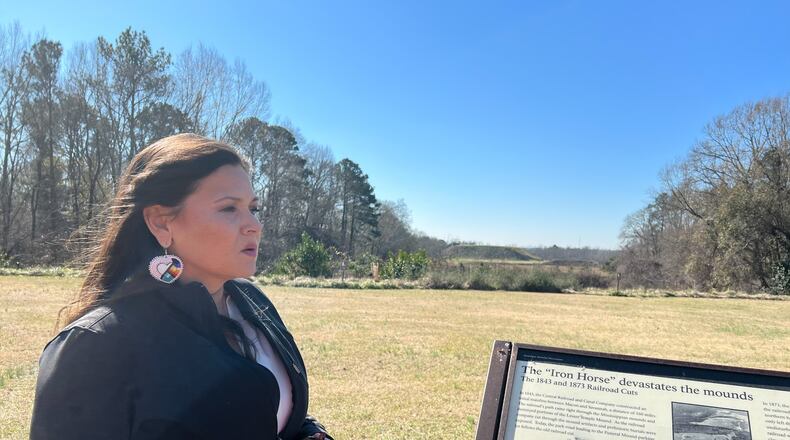MACON-- As lawmakers in Atlanta tangle themselves into knots about how to tell the history of Georgia’s often-painful past, an example they should take note of is underway 75 miles south along the banks of the Ocmulgee River in Macon.
That’s where I found Seth Clark and Tracie Revis earlier this week when I went to visit the Ocmulgee National Park and Preserve Initiative, one of several groups working together to expand the Ocmulgee Mounds National Historical Park through an extraordinarily beautiful swath of Middle Georgia to become the state’s first National Park and Preserve.
Clark is the executive director of the nonprofit group and the plan he lays out initially seems like other conservation efforts you might have seen before.
A plan to protect thousands of acres along the Ocmulgee River from development would permanently preserve local lands for hunting and fishing.
Preserving the land would also help protect portions of the Ocmulgee River Basin, one of the most ecologically significant ecosystems in the Southeast, which is suffering the effects of farming, industrial development and climate change.
Even the boosters of nearby Robins Air Force Base say protecting the land would ensure the Air Force will have crucial space for overland training.
But it is Revis’s involvement that makes the project unique.
She is both a citizen of the the Muscogee (Creek) Nation and, as of this week, the newest hire in the effort to tell the rarely heard story of the Creek people in Middle Georgia through the voices of their own descendants.
“Part of me being here is shedding a light on the history that hasn’t been told,” Revis said this week. “Georgia has a deep history. Macon has a deep history. But our story was here thousands of years prior to that.”
The Creek people and their ancestors once thrived along the Ocmulgee River, Rivas said, where they hunted, fished, built ancestral mounds, and created a complex culture.
Her tribe’s elders in Oklahoma tell stories passed down to them about the towns, governments, and even stickball games the tribes used to play here.
But as white settlers moved into the area, the Creeks were forcibly removed by federal troops in the 1800s to make way for plantations and new settlements.
Once pushed out of Georgia, they were marched through Alabama to Oklahoma while they endured years of rape, murder and the sorts of atrocities you hear about in a war crimes report.
Clark and Revis know the full story may be hard for some people to hear, but it’s essential to understand to fully put our history in context.
“It’s their story to tell,” said Clark. “There’s an intentionality behind bringing Tracie here because it’s not our story to tell.”
Revis was still unpacking the boxes in her office when I visited Wednesday. She had just moved from Oklahoma, where was she was born, went to college, and eventually became the first female chief of staff to the Chief of the Muscogee (Creek) Nation.
She also holds a degree in Indian Law and once worked on Capitol Hill for Rep. Raul Grijalva, so she is an expert in Indian Law and advocacy.
Her first order of business as the director of advocacy for the group will be planning and opening a cultural center now slated for one of Macon’s oldest homes overlooking downtown Macon in in direction and the Ocmulgee Mounds in another. It will be owned and operated by the Muscogee (Creek) Nation.
There, she and a staff of others from the Nation will tell the story of their civilization, including the names, architecture, and language that infuse Middle Georgia without most people ever knowing their origin. They’ll also tell the story of their removal from the land.
“I approach this from an education standpoint,” Rivas said. “There’s an ignorance because the true story hasn’t been available to be told. I don’t fault anyone for not knowing. I look at it as this is the opportunity for us to come together.”
The cultural center is just one part of the overall project.
Another is the decades-long effort to expand the footprint of the park itself, from about 700 acres today up to 50,000 acres in the future.
A public-private partnership is set to more than double the park acreage in early February.
The ultimate vision connects a 54-mile stretch along the Ocmulgee River Corridor from downtown Macon through the Bond Swamp National Wildlife Refuge to Hawkinsville in Pulaski County.
The final piece of the puzzle is to get a federal designation as a National Park and Preserve, a change that U.S. Reps. Austin Scott and Sanford Bishop (a Republican and a Democrat) and U.S. Sen. Jon Ossoff have been working to move forward.
Scott is both a hunter and booster of Robins Air Force Base. Ossoff, a Democrat, has made conservation and climate change a focus of his time in Washington. Helpfully, the project rings all three of those bells.
The timing also seems aligned for the years-long effort, with bipartisan support from the Georgia delegation and two American Indians, Deb Haaland and Chuck Sams, leading the Department of the Interior and the National Park Service under President Joe Biden for the first time in history.
But for Revis, returning to Middle Georgia where generations before her lived and thrived before ultimately surviving displacement, the project also means keeping her own history alive for the future.
“We’re losing our language. We’re losing our elders. We’re losing people left and right,” she said. “So part of making the jump from that home to this home is that, if we don’t tell those stories now, the history will be lost forever.”
About the Author
Keep Reading
The Latest
Featured



